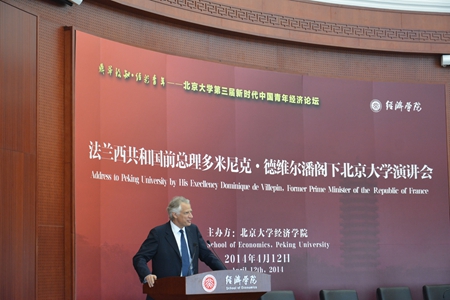Peking University, Apr. 15, 2014: “The reform of the international credit rating system is at present the most crucial economic reform in the world, and Asia will take on the leadership in this upcoming change,” said Mr. Dominique de Villepin, former Prime Minister of the Republic of France, in his recent address to the students at Peking University (PKU).

Mr. de Villepin
On April 12, Mr. de Villepin paid a visit to PKU at the invitation of the School of Economics, the organizer of the New China Youth Economics Forum 2014.
The former prime minister, who has been working for the newly established Universal Credit Rating Group as the chairperson of its Committee of International Consultants since 2013, delivered a speech titled “China’s Role in the Reform of the Credit Rating System” at the forum.
Prior to his visit to PKU, Mr. de Villepin just attended the session with the theme of “Rebuilding the Post-Crisis Global Rating System” at the Bo’ao Forum for Asia 2014. He opened his formal address by quoting Premier Li Keqiang’s speech in Hainan, encouraging the young generation to assume the duties of realizing the ‘Chinese Dream’ and revitalizing their nation.

The audience
He also emphasized the immense value of the youth’s actual engagement in cross-cultural exchanges and encouraged the young Chinese to take a new Silk Route by going abroad and tasting the true flavor of a foreign culture.
In the present Post-Crisis period, as Mr. de Villepin pointed out, it was extremely urgent and necessary for the global community to take measures to counteract the worldwide financial instability. He highlights that reforms in various economic spheres should be undertaken concurrently, such as currency, banking and overseas investment, for the diversification of the reforms and the extension of their influence.
Mr. de Villepin believed that the principle of common participation, rather than that of hegemony, should be established in the global financial reform. “Different countries and regions should reach agreements on pluralism, trust and justice to facilitate their sincere, effective cooperation and open up ‘a spiritual Silk Route’ for their intercommunication,” he said.
According to Mr. de Villepin, Asia, with its increasing cultural soft power, was becoming a key participant in the present international financial system, although it still had to face a series of thorny problems such as the risks of globalization, environmental pollution, peripheral political conflicts and the inadequacy of infrastructure.
Mr. de Villepin extolled China as an open and tolerant nation which had substantially contributed to the harmony and pluralism of Asia. He pointed out that China and other major creditor countries in the Asian-Pacific region should have more voices in international finance.
A new, complementary credit rating mode should be established in Asia, which was distinct from those adopted by the three major credit rating agencies, i.e. Standard & Poor’s, Moody’s and Fitch, since the Big Three had failed to predict and defuse the financial crisis of 2008.
“In order to deal with the complexities of our ever-changing world, every participant in the global reform should have enough foresight, imagination and confidence to establish innovative modes and take practical measures against the growing problems,” Mr. de Villepin said.
Written by: Chen Jiayu
Edited by: Li Wenrui
Source: School of Economics